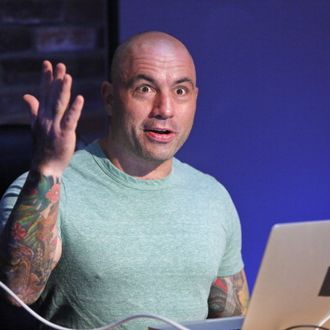
Joe Rogan is driving another round of unsurprising headlines.
Earlier this week, Rolling Stone reported that more than 270 medical professionals, public health experts, and science educators have penned an open letter to Spotify, demanding the company takes action against “mass-misinformation events which continue to occur on its platform,” specifically targeting The Joe Rogan Experience as the prominent vector of that misinformation. The letter had been instigated by a December 31, 2021 episode featuring Robert Malone, a physician that has been identified in recent months as a potent spreader of COVID-19 vaccine misinformation, who, among other things, described the trust that most Americans show in the vaccination effort as a “mass formation psychosis.”
This is the latest chapter in a long-running stream of pandemic-related controversies embroiling The Joe Rogan Experience stretching back to the early stages of the vaccine rollout, when the prominent podcast host generally expressed skepticism towards its necessity. Last September, Rogan announced that he had tested positive for COVID, and that he had taken ivermectin, the horse medicine the FDA had warned the public not to consume, to deal with his symptoms. And in December, shortly before Malone’s appearance on the podcast and after rescheduling upcoming live shows in Vancouver due to Canada’s vaccine mandates, Rogan publicly stated that he wasn’t vaccinated. “I don’t think I can even get into the country. I’m not vaccinated. I’m not gonna get vaccinated. I have antibodies, it doesn’t make any sense,” he said.
In the open letter, the coalition noted that The Joe Rogan Experience wasn’t the only source of misinformation on the platform, but it was indicative of a much broader failure. To that end, they posed a specific demand: “We, the undersigned doctors, nurses, scientists, and educators thus call on Spotify to immediately establish a clear and public policy to moderate misinformation on its platform.” (Spotify declined to comment.)
However, as Platformer’s Casey Newton pointed out, the platform already has such a policy, which it issued in a statement back in January 2021:
“Spotify prohibits content on the platform which promotes dangerous false, deceptive, or misleading content about COVID-19 that may cause offline harm and/or pose a direct threat to public health. When content that violates this standard is identified it is removed from the platform.”
The problem, of course, is simply a lack of enforcement — or more specifically, enforcement in a way that’s able to robustly and comprehensively address misinformation across the platform. As Bloomberg reported, since the pandemic began, Spotify has removed over 20,000 podcast episodes containing COVID misinformation in accordance to its policy, but it hasn’t prevented some podcast creators from skirting the line and successfully spreading falsehoods.
This remains tricky ground for Spotify, which struck an exclusive multi-year licensing deal with The Joe Rogan Experience in the summer of 2020 reportedly valued at around $100 million. The podcast continues to be a huge audience driver for the platform, and it undoubtedly serves as the arrowhead for its emerging podcast advertising business. For these reasons, the company has appeared willing to bear a good deal of controversy, friction, and headaches. Spotify has been generally able to ride the past few Rogan-related storms, usually leaning on the relative newness of their position as a publisher.
But newness fades, and the questions of accountability keep coming, along with louder arguments as to the consequences. “This is not only a scientific or medical concern; it is a sociological issue of devastating proportions and Spotify is responsible for allowing this activity to thrive on its platform,” the letter wrote.


